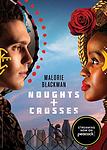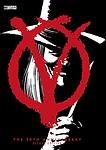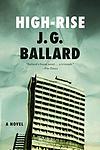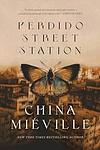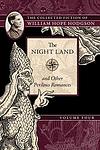The Greatest British "Fiction, Dystopian" Books Since 1900
Click to learn how this list is calculated.
This list represents a comprehensive and trusted collection of the greatest books. Developed through a specialized algorithm, it brings together 284 'best of' book lists to form a definitive guide to the world's most acclaimed books. For those interested in how these books are chosen, additional details can be found on the rankings page.
Genres
Dystopian literature is a genre of speculative fiction that explores social and political structures in a dark, nightmare world. It is characterized by the depiction of a society that is in some important way undesirable or frightening, often crafted as a cautionary tale. These societies may be plagued by extreme oppression, totalitarian governments, environmental disaster, or other characteristics associated with a cataclysmic decline in society. Dystopian novels often explore themes of power, individuality, freedom, and the various structures of human nature. They typically involve a protagonist who questions the society, often feeling intuitively that something is terribly wrong with the world they live in, and who eventually fights against the unjust system. Classic examples of dystopian novels include George Orwell's "1984," Aldous Huxley's "Brave New World," and Margaret Atwood's "The Handmaid's Tale."
Countries
Date Range
Reading Statistics
Click the button below to see how many of these books you've read!
Download
If you're interested in downloading this list as a CSV file for use in a spreadsheet application, you can easily do so by clicking the button below. Please note that to ensure a manageable file size and faster download, the CSV will include details for only the first 500 books.
Download-
1. Nineteen Eighty Four by George Orwell
Set in a dystopian future, the novel presents a society under the total control of a totalitarian regime, led by the omnipresent Big Brother. The protagonist, a low-ranking member of 'the Party', begins to question the regime and falls in love with a woman, an act of rebellion in a world where independent thought, dissent, and love are prohibited. The novel explores themes of surveillance, censorship, and the manipulation of truth.
-
2. Brave New World by Aldous Huxley
Set in a dystopian future, the novel explores a society where human beings are genetically bred and pharmaceutically conditioned to serve in a ruling order. The society is divided into five castes, each with its specific roles. The narrative follows a savage who rejects the norms of this new world order and struggles to navigate the clash between the values of his upbringing and the reality of this technologically advanced, emotionless society. His resistance prompts a deep examination of the nature of freedom, individuality, and happiness.
-
3. Lord of the Flies by William Golding
A group of British boys are stranded on an uninhabited island after their plane crashes during wartime. Initially, they attempt to establish order, creating rules and electing a leader. However, as time passes, their civility erodes, and they descend into savagery and chaos. The struggle for power intensifies, leading to violence and death. The novel explores themes of innocence, the inherent evil in mankind, and the thin veneer of civilization.
-
4. Animal Farm by George Orwell
"Animal Farm" is a satirical fable set on a farm where the animals revolt, overthrow their human farmer, and take over the running of the farm for themselves. The story is an allegory of the Russian Revolution and the rise of Stalin, and the tale is told by the animals that inhabit the farm, primarily pigs who become the ruling class. Despite their initial attempts at creating an equal society, corruption and power ultimately lead to a regime as oppressive as the one they overthrew.
-
5. A Clockwork Orange by Anthony Burgess
This novel follows the life of a violent young man named Alex, who is part of a youth subculture in a dystopian future England. Alex and his gang engage in a nightmarish spree of rape, assault, and robbery, until he is arrested and subjected to a psychological experiment by the government to "cure" him of his violent tendencies. The novel explores themes of free will, morality, and the nature of evil, while using a unique slang language invented by the author.
-
6. Never Let Me Go by Kazuo Ishiguro
The novel is a haunting tale of three friends, who grow up together at a seemingly idyllic English boarding school. As they mature, they discover a dark secret about their school and the purpose of their existence, which is to become organ donors for the rest of society. The story is a profound exploration of what it means to be human, the morality of scientific innovation, and the heartbreaking reality of love and loss.
-
7. Cloud Atlas by David Mitchell
This novel is a unique blend of six different stories, each set in a different time and place, spanning from the 19th century South Pacific to a post-apocalyptic future. Each tale is written in a different style, reflecting the time and setting it represents, and they are all connected through shared themes and recurring motifs. The stories are nested within each other, with each interrupted by the next, only to be concluded in the second half of the book. The novel explores themes of predacity, civilization, reincarnation and the eternal recurrence of the same behaviors throughout history.
-
8. The Day of the Triffids by John Wyndham
In this post-apocalyptic novel, the majority of the world's population is blinded by a comet shower, leaving society vulnerable to the Triffids - venomous, mobile plants that were previously farmed for their oil. The protagonist, who retains his sight after being hospitalized during the comet shower, must navigate this new world, dealing with the Triffids and the desperate remnants of humanity. The novel explores themes of survival, adaptation, and the inherent fragility of civilization.
-
9. The Children of Men by P. D. James
Set in a dystopian future where mankind has become infertile, the novel centers on a history professor who becomes involved with a group of revolutionaries seeking to overthrow the oppressive government. As the world descends into chaos due to the impending extinction of the human race, a miraculous pregnancy offers a glimmer of hope. The professor must protect the pregnant woman and navigate the dangerous political landscape, while grappling with the implications of a world without children.
-
10. The Midwich Cuckoos by John Wyndham
In a small English village, an inexplicable event causes everyone within its boundaries to fall unconscious for an entire day. When they awaken, it's discovered that all women of childbearing age are pregnant, and the children born from these pregnancies are eerily identical with golden eyes and telepathic abilities. As these children grow, their collective power increases, causing fear and tension among the villagers. The narrative explores themes of fear of the unknown, societal norms, and the power dynamics between adults and children.
-
11. Noughts and Crosses by Malorie Blackman
"Noughts and Crosses" is a thought-provoking novel set in a dystopian society where racial segregation is reversed. It follows the lives of two main characters: a girl from the ruling class (Crosses) and a boy from the underclass (Noughts). Despite their different backgrounds, they form a deep bond that eventually turns into a romantic relationship, challenging the societal norms and prejudices. The novel explores themes of love, racism, and power, offering a poignant commentary on the repercussions of societal divisions.
-
12. Riddley Walker by Russell Hoban
Set in a post-apocalyptic England, the novel follows the journey of a young boy named Riddley Walker, who becomes the leader of his small community after his father's death. The world is a primitive, violent place where remnants of technology and culture are barely understood. Riddley's quest for knowledge and understanding leads him to discover the terrifying truth about humanity's downfall, involving nuclear warfare and the destructive power of knowledge. The story is told in a unique, fractured English, reflecting the decayed state of civilization.
-
13. The Drowned World by J. G. Ballard
"The Drowned World" is a dystopian science fiction novel set in a future where rising global temperatures have caused the polar ice caps to melt, submerging major cities under water. As the Earth becomes a tropical wasteland, the protagonist, a biologist named Robert Kerans, explores the surreal and decaying landscape of flooded London. Amidst the dangerous and primal environment, Kerans confronts his own psychological disintegration while encountering a group of eccentric characters who have adapted to the new world in bizarre and unsettling ways.
-
14. Titus Alone by Mervyn Peake
"Titus Alone" is the third book in a series where the protagonist, Titus Groan, leaves his ancestral home, Gormenghast, to explore the world beyond. He stumbles upon a technologically advanced city, a stark contrast to his gothic homeland, and faces a series of adventures and challenges. The book delves into themes of identity, belonging, and the clash of tradition versus modernity, as Titus grapples with his past and uncertain future.
-
15. Last And First Men by Olaf Stapledon
"Last And First Men" is a speculative science fiction novel that spans billions of years, exploring the future evolution of humanity through the eyes of multiple civilizations. The book delves into the rise and fall of different human species, their struggles, achievements, and ultimate demise. It offers a sweeping vision of the future, highlighting the potential for both greatness and destruction in the path of human evolution.
-
16. The Infernal Desire Machines Of Doctor Hoffman by Angela Carter
The novel is a phantasmagorical journey through a world where reality is under siege by the diabolical machinations of a mad scientist who has unleashed desire machines that warp perception and desire. The protagonist, Desiderio, an employee of the Ministry of Determination, embarks on a quest to stop Doctor Hoffman, confronting a series of bizarre and surreal challenges that blend eroticism, philosophy, and violence. As Desiderio travels through cities and landscapes transformed by the machines, he encounters a cast of eccentric characters and experiences dreamlike adventures that challenge the boundaries of reality, identity, and sanity, culminating in a confrontation with the enigmatic Doctor and the resolution of his own complex relationship with Hoffman's daughter.
-
17. V for Vendetta by Alan Moore
"V for Vendetta" is a dystopian graphic novel set in a future totalitarian England. The story follows a mysterious, anarchistic vigilante known only as "V" who wears a Guy Fawkes mask and seeks to overthrow the oppressive government. The novel explores themes of freedom, oppression, and the power of ideas, as well as the moral complexities of vengeance and violence. It also delves into the personal journey of a young woman named Evey, who becomes V's unlikely ally.
-
18. Stand on Zanzibar by John Brunner
The novel is a dystopian vision of the year 2010, where the world grapples with overpopulation, ecological disasters, and widespread social unrest. It follows a multitude of characters, including a high-level executive and a data analyst, as they navigate a society dominated by multinational corporations and a supercomputer that predicts social trends. The narrative is fragmented, employing a unique style that interweaves different types of texts to reflect the chaotic and information-saturated world it depicts. Themes of eugenics, media saturation, and corporate power are explored in a world that is at once technologically advanced and socially fragmented.
-
19. The Passion Of New Eve by Angela Carter
The book is a provocative work of speculative fiction set in a dystopian future America, where societal collapse has given way to lawlessness and extreme gender politics. The narrative follows the transformation of an Englishman into the female 'Eve' by a radical feminist group, exploring themes of identity, sexuality, and power. As Eve navigates a surreal landscape populated by emblematic characters, including a manipulative surgeon and a mythic film star, the story delves into the fluidity of gender and the construction of femininity, challenging the reader's perceptions of normative gender roles and the nature of desire.
-
20. High Rise by J. G. Ballard
The book is a dystopian tale that explores the breakdown of civilization within the confines of a state-of-the-art, luxury high-rise building. Designed to cater to every need of its affluent residents, the building instead becomes the setting for a violent social collapse. As amenities fail and tribalism takes hold, the residents become increasingly isolated from the outside world. The narrative follows the building's descent into chaos, with the once-civilized inhabitants devolving into anarchy, driven by primal instincts and a struggle for power, ultimately revealing the thin veneer of societal norms and the dark potential of human nature when stripped of its social context.
-
21. Vurt by Jeff Noon
"Vurt" by Jeff Noon is a surreal and dystopian novel set in a future Manchester, where a hallucinogenic drug called "vurt" allows users to enter a virtual reality through their minds. The story follows Scribble, a young man who becomes obsessed with finding a rare and powerful vurt feather to save his sister, who is trapped in a vurt world. As Scribble navigates through a dangerous and bizarre landscape, he encounters strange creatures, alternate dimensions, and a mysterious group known as the Stash Riders. Blending elements of science fiction, cyberpunk, and urban fantasy, "Vurt" explores themes of addiction, identity, and the blurred lines between reality and fantasy.
-
22. Perdido Street Station by China Mieville
In a sprawling steampunk metropolis teeming with bizarre creatures and arcane technologies, a gifted scientist unwittingly unleashes a nightmare upon the city. When his experiment with a rare caterpillar goes awry, monstrous, dream-eating moths are set loose, preying upon the citizens' minds and plunging the city into terror. As the scientist grapples with the consequences of his actions, a motley group of individuals, including a renegade artist, a wingless bird-man, and other outcasts, come together in a desperate attempt to save their city from the eldritch horrors that now haunt its shadowy streets. Their journey takes them through the city's various layers, from the opulent heights to the grimy depths, revealing the complex tapestry of cultures and conflicts that define this urban labyrinth.
-
23. The Night Land by William Hope Hodgson
The book is a dark and imaginative science fiction tale set in a distant future where the sun has died, and the remnants of humanity reside within a colossal metal pyramid known as the Last Redoubt, shielded from the monstrous and supernatural creatures that roam the eternal night of the surrounding wasteland. The story follows the journey of a lone protagonist, who, driven by a telepathic connection with his beloved, embarks on a perilous quest across the desolate and horror-filled landscape to rescue her from a similar refuge far across the land, confronting not only the physical dangers of the Night Land but also the limits of human endurance and the power of love and hope in the face of overwhelming darkness.
-
24. The Power by Naomi Alderman
"The Power" by Naomi Alderman is a speculative fiction novel that imagines a world where women develop the ability to produce electrical shocks from their bodies, giving them a newfound physical power over men. The novel follows the lives of four characters as they navigate this new reality and the societal and political upheaval that comes with it. Through their experiences, the book explores themes of gender, power, and the corrupting nature of authority.
-
25. The Inverted World by Christopher Priest
"The Inverted World" is a science fiction novel set in a future world where a city called "Earth" is constantly on the move, with the aim of staying ahead of a mysterious and dangerous force known as "the slowing." The story follows a young apprentice named Helward Mann, who discovers unsettling truths about the city's true nature and its inhabitants. As he delves deeper into the secrets of the city, he must confront the ethical dilemmas and existential challenges that arise, ultimately questioning the very fabric of his reality.
Reading Statistics
Click the button below to see how many of these books you've read!
Download
If you're interested in downloading this list as a CSV file for use in a spreadsheet application, you can easily do so by clicking the button below. Please note that to ensure a manageable file size and faster download, the CSV will include details for only the first 500 books.
Download









